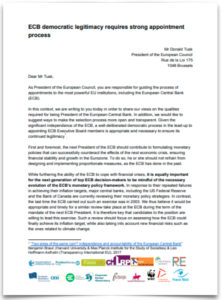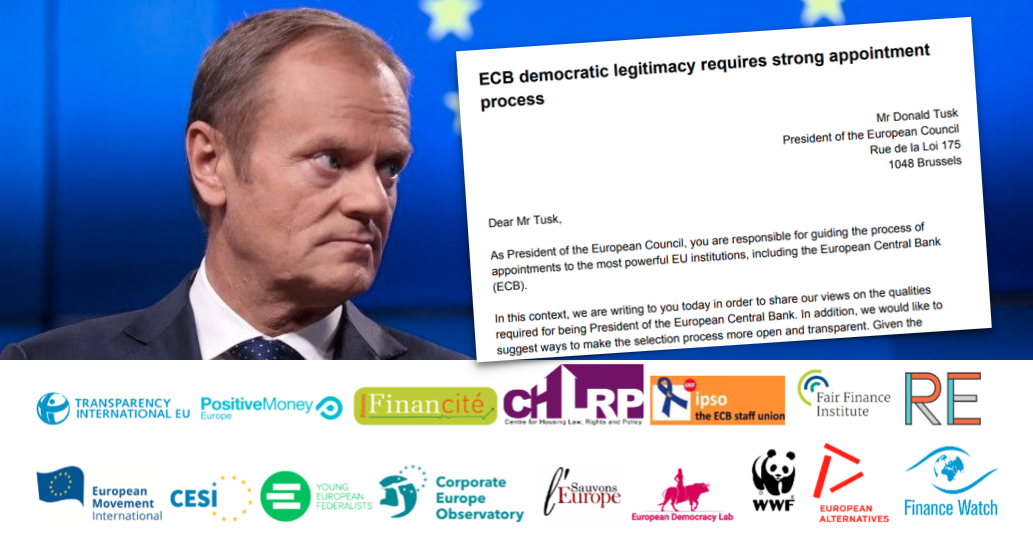Ahead of an important European Council meeting this week, sixteen NGOs led by Positive Money Europe have co-signed an open letter addressed to Donald Tusk demanding a stronger appointment process in line with the independence of the European Central Bank.
As of November, Mario Draghi will leave his position as President of the European Central Bank (ECB). According to the treaties, the European Council (which gathers all European Heads of States) makes a final decision on the appointment, after having consulted the European Parliament and the ECB’s Governing Council. Today (June 20th 2019), EU leaders are set to decide on the frontrunners in the ECB Presidency race.
As the negotiations for his replacement are in full swing, 16 NGOs led by Positive Money Europe sent an open letter (pdf) to Donal Tusk, the President of the European Council. In the letter, NGOs share their views and their proposals to ensure the appointment process is open and transparent. This joint statement proves that civil society is carefully following the steps taken by policymakers in this regard. In this context, NGOs claim the next President of the ECB should be someone who has a clear plan to counteract the effects of the next financial crisis that includes proportionate and effective measures. In Positive Money Europe’s view, he or she should commit to reviewing the ECB’s monetary policy strategy, and be willing to consider new unconventional instruments such as Helicopter Money.
 Moreover, the letter addresses the lack of diversity in the Governing Council, calling for a more inclusive ECB that opens the door to diverse backgrounds and perspectives, going even beyond gender considerations. In this context, NGOs recommend the introduction of shortlisting to achieve more diversity.
Moreover, the letter addresses the lack of diversity in the Governing Council, calling for a more inclusive ECB that opens the door to diverse backgrounds and perspectives, going even beyond gender considerations. In this context, NGOs recommend the introduction of shortlisting to achieve more diversity.
Positive Money Europe has eagerly participated in the debate on the appointment process on the ECB top policymakers. Earlier this April we published our report “From Dialogue to Scrutiny: Strengthening the Parliamentary oversight of the European Central Bank”, in which we proposed that the European Parliament should have a stronger role in the appointment process. As the European Parliament has already fought for the introduction of a balanced shortlist in the past, we will make sure the newly elected MEPs will continue working on this pressing matter.
Here’s the text of the open letter:
Dear Mr Tusk,
As President of the European Council, you are responsible for guiding the process of appointments to the most powerful EU institutions, including the European Central Bank (ECB).
In this context, we are writing to you today in order to share our views on the qualities required for being President of the European Central Bank. In addition, we would like to suggest ways to make the selection process more open and transparent. Given the significant independence of the ECB, a well-deliberated democratic process in the lead-up to appointing ECB Executive Board members is appropriate and necessary to ensure its continued legitimacy.
First and foremost, the next President of the ECB should contribute to formulating monetary policies that can successfully counteract the effects of the next economic crisis, ensuring financial stability and growth in the Eurozone. To do so, he or she should not refrain from designing and implementing proportionate measures, as the ECB has done in the past.
While furthering the ability of the ECB to cope with financial crises, it is equally important for the next generation of top ECB decision-makers to be mindful of the necessary evolution of the ECB’s monetary policy framework. In response to their repeated failures in achieving their inflation targets, major central banks, including the US Federal Reserve and the Bank of Canada are currently reviewing their monetary policy strategies. In contrast, the last time the ECB carried out such an exercise was in 2003. We thus believe it would be appropriate and timely for a similar review take place at the ECB during the term of the mandate of the next ECB President. It is therefore key that candidates to the position are willing to lead this exercise. Such a review should focus on assessing how the ECB could finally achieve its inflation target, while also taking into account new financial risks such as the ones related to climate change.
Third, we welcome your commitment to ensuring greater gender balance in the upcoming nomination procedures. It is an appalling situation that only one woman currently sits in the ECB’s Executive board and only two women are members of the Governing Council. That said, the need for greater diversity goes beyond gender consideration and should involve also diverse backgrounds, experiences and perspectives. We count on your appreciation of this poor record when shepherding the negotiations.
Last but not least, we believe that in order to ensure the fulfilment of these criteria, it would be key to involve the European Parliament more effectively throughout the appointment process. As you may recall, the MEPs have suggested several times that the European Parliament should be provided with balanced shortlist of candidates. In our view, such a shortlist would empower the European Parliament to make genuine recommendations to the Council and, crucially, it would help avoid repeating the undesirable situation in which the European Parliament would object to the nominee put forward by the Council without being able to recommend an alternative.
Finally, we would also like to remind you that the position of Benoit Cœuré at the ECB’s board is set to become vacant in January 2020. It could be opportune to join those two appointments in the same process of shortlisting the candidates.
In our understanding, Article 283 TFEU leaves much room for improving the appointment process. In particular, the content and extent of the consultative role of the European Parliament in appointing ECB Executive Board members remain a matter of interpretation. It falls onto your responsibility and leadership to make use of this leeway to ensure the appointment process becomes more transparent and democratic than the minimum Treaty requirements.
Yours sincerely,
List of signatories:
Stanislas Jourdan, Positive Money Europe
Benoît Lallemand, Finance Watch
Leo Hoffmann-Axthelm, Transparency International EU
Sebastien Godinot, WWF
Ulrike Guérot, European Democracy Lab
Klaus Heeger, European Confederation of Independent Trade Unions (CESI)
Petros Fassoulas, European Movement International
Markus Duscha, Fair Finance Institute
Emmanuel Larue and Carlos Bowles, IPSO (ECB staff trade union)
Bernard Bayot, Financité
Kenna Padraic, Centre for Housing Law, Rights and Policy NUI Galway.
Daphne Büllesbach, European Alternatives
Christopher Glueck, Young European Federalists (JEF)
Benoit Bloissere, Sauvons l’Europe
Kenneth Haar, Corporate Europe Observatory
Maeve Cohen, Rethinking Economics
To download the letter, click here

